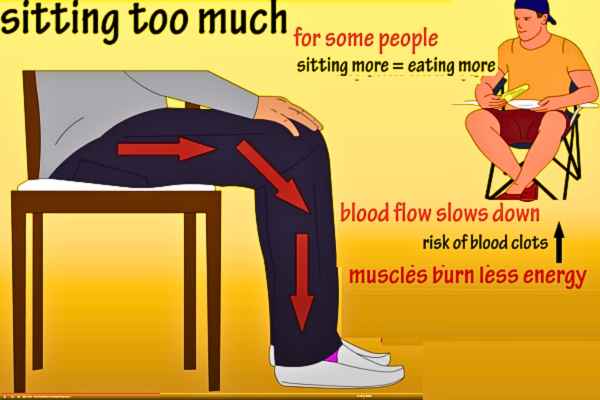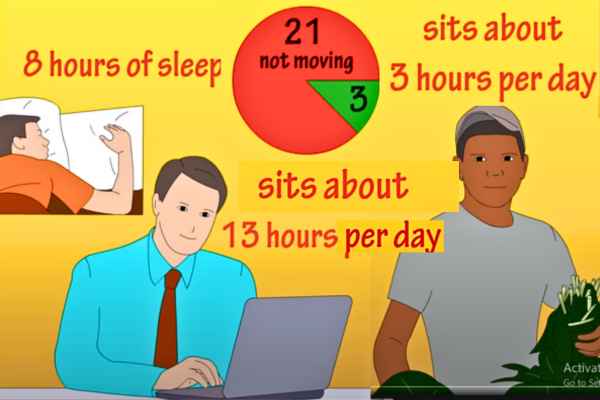In our modern world, it’s no secret that many of us lead a SEDENTARY LIFESTYLE. Our daily routines often involve prolonged periods of SITTING, whether at a desk, in front of a computer, or during our daily commute. But what might come as a surprise is the significant impact this prolonged sitting has on our health, especially on our BRAIN.
The Negative Effects of Prolonged Sitting
When you spend extended hours seated, you might notice a myriad of health issues creeping up on you. These issues range from poor posture to cognitive decline, and they paint a worrisome picture of the consequences of our SEDENTARY LIFESTYLES. Here’s a closer look at the challenges associated with Prolonged Sitting:
1. Poor Posture Prolonged Sitting
SITTING for long stretches often results in poor posture. This can lead to neck and back pain, and it’s not just about physical discomfort – poor posture can also interfere with your cognitive tasks and contribute to overall discomfort.
2. Decreased Brain-Derived Neurotrophic Factor (BDNF) Prolonged Sitting
BRAIN-DERIVED NEUROTROPHIC FACTOR (BDNF) is a protein that plays a pivotal role in brain health, including memory and learning. Prolonged sitting has been linked to lower BDNF levels, which could have a negative impact on your cognitive abilities.
3. Cognitive Decline Prolonged Sitting
Studies have shown that sedentary behavior is associated with a higher risk of cognitive decline and dementia, especially in older adults. This is a concerning revelation about the long-term effects of sitting.
4. Reduced Blood Flow Prolonged Sitting

The amount of blood flowing to the brain can be decreased by extended sitting. This, in turn, can impair cognitive function and elevate the risk of neurological conditions.
5. Mood Changes Prolonged Sitting
It might come as a surprise, but sedentary behavior has also been linked to mood disorders such as depression and anxiety. Our BRAIN and our emotions are intricately connected.
6. Poor Concentration Prolonged Sitting
SITTING for long hours can make it challenging to concentrate and focus on tasks. Decreased productivity and mental fatigue are often the results.
7. Slower Information Processing
Prolonged sitting slows the speed at which the brain processes information. This hinders quickness of thought and decision making, thereby lowering productivity.
8. Reduced Brain Plasticity
Physical activity is crucial for maintaining brain plasticity, which is the brain’s ability to adapt and change in response to new experiences. A SEDENTARY LIFESTYLE may reduce this plasticity, limiting your brain’s ability to evolve and learn.
9. Increased Risk of Stroke
Excessive sitting is associated with an increased risk of cardiovascular problems, including strokes. These health issues can have a direct impact on brain health.
10. Increased Stress
SITTING for extended periods can lead to higher stress levels, which can negatively impact brain health and your overall well-being.
A Disturbing Trend: The Mortality Risks of Prolonged Sitting
The negative effects of Prolonged sitting don’t stop at cognitive decline and poor posture. Recent research has uncovered some alarming insights into the connection between excessive sitting and our overall health.
One of the main reasons sitting too much is detrimental to our health is that our leg muscles, the largest in our bodies, remain mostly inactive when we’re seated. This inactivity leads to a slowdown in metabolism and decreased blood flow, both of which contribute to increased blood sugar levels and higher levels of neutral fat. These factors are associated with various diseases and can also have a direct impact on our blood pressure.
The Mortality Risk
An Australian research group closely followed 220,000 individuals aged 45 and older for approximately three years. The results were staggering – those who sat for an average of 11 hours or more per day had a 1.4 times higher mortality rate than those who sat for less than four hours daily.
When analyzing 34 studies from around the world examining the relationship between sitting time and mortality, researchers found that the risk increases significantly once you cross the threshold of approximately eight hours of sitting daily. These studies also revealed that sitting time is closely linked to the development of obesity and diabetes, deaths from conditions like cancer or pulmonary thromboembolism, and even cognitive decline.
In particular, Japanese people seem to be at high risk due to their long hours of sitting. Data from the National Health and Nutrition Survey in Japan showed that 38% of men and 33% of women report a total sitting time of “8 hours or more” on weekdays. This is the highest percentage compared to other countries internationally.
Furthermore, in various studies, the mortality rates differed significantly between those who sat continuously for long hours and those who incorporated breaks, even if the total duration of sitting was the same.
Taking Action for a Healthier Future
Understanding the risks and consequences of excessive sitting is the first step toward building a healthier future. Incorporating regular breaks for physical activity, maintaining good posture, and engaging in activities that promote brain health are crucial. Regular exercise, mental stimulation, and a balanced diet can significantly mitigate the negative effects of sitting.
Additionally, implementing changes in your work environment can help. Sit-stand desks have become popular, allowing individuals to switch between sitting and standing throughout the day. Short walks during breaks can also reduce the negative impact of prolonged sitting on both your brain and overall health.
So, the next time you’re tempted to spend hours sitting at your desk, consider the consequences for your brain and your health. Take a break, go for a walk, and make those healthy choices that will keep your brain sharp and your body in good shape. It’s a small change that can make a significant difference in the long run.




